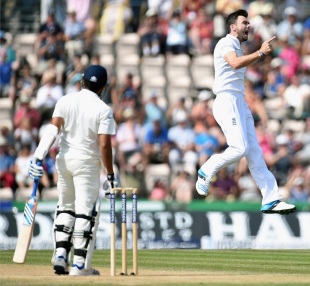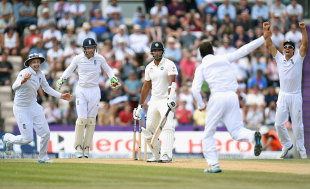India v England, 2014
Hugh Chevallier

|
|||
|
Related Links
Tour and tournament reports : India v England, 2014
Matches:
England v India at Southampton
Series/Tournaments:
India tour of England
|
|||
At Southampton, July 27-31. England won by 266 runs. Toss: England. Test debuts: J. C. Buttler; Pankaj Singh.
Had this been a political contest, it would have been referred to the electoral authorities, so wildly one-sided was the outcome. The opinion polls - or at least England's recent Test form - had suggested an India victory and, quite probably, the unceremonious ousting of the defeated leader, Cook, whose back had been pressed so firmly against the wall over 11 winless months that it must have long since become uncomfortably numb. Perhaps that helped him shoulder the opprobrium hurled his way.
But one of the glories of elections, and sport, is the unexpected. By winning the key battlegrounds - indeed they won every one of the game's 13 sessions - England strode to landslide success. And just as improbably Cook made runs, even if he could not quite reach the three figures he and the ECB grandees craved. It wasn't just the captain given a new lease of life: had India, fresh from their win at Lord's, gone 2-0 up with two to play, the series too would have been beyond recovery.
In that Lord's victory, India - whose weakest suit has traditionally been pace - had bounced out England. Now came the inverse: an England team who, since the retirement of Graeme Swann in December, believed their aces lay in their seam attack, spun out India. Someone had given both packs a shuffle. The toss presented Cook with a quandary. Without a win in ten Tests, or a century in 14, he might have been forgiven for bowling on a greenish pitch. The courageous move, though, was to bat. Courage had never been the problem, and Cook padded up. His team showed three changes. Buttler made his debut behind the stumps after Matt Prior ruled himself out on fitness grounds, Ben Stokes was replaced by fellow all-rounder Woakes, while Jordan came in for Liam Plunkett, nursing a sore ankle. For India, Stuart Binny, given only 20 overs in two Tests, was dropped in favour of batsman Rohit Sharma, further diluting the attack after the Lord's destroyer, Ishant Sharma, also hurt his ankle. In came Pankaj Singh, another debutant.
Three years earlier, the Rose Bowl's first Test had been ruined by the weather. Now the skies were set fair but, for Hampshire, clouds remained. To squeeze in a five-match series, play started on a Sunday, encouraging a near-full house for the first day, but denying the hosts any corporate (aka lucrative) hospitality. In fact, attendance of any sort was poor for the next three days until a combination of lower prices and a likely home win brought a respectable crowd on the last morning. That seemed to take Hampshire by surprise, and punters struggled to reach a ground inaccessible without park-and-ride arrangements.
Cook began uncertainly, his footwork more ball-and-chain than ballroom. On 15, a familiar story threatened to unfold, with a tentative prod bringing a thick edge. But Jadeja, at third slip, fluffed the catch. Newton's third law states that, for every action, there is an equal and opposite reaction, and cricket is no different. So while Cook (unlike Jadeja) grabbed his chance with both hands and, in his own words, began to "get back into the ball", poor Pankaj Singh, a genial, 29-year-old, 6ft 6in wall of gym-bound muscle, was the victim. On a surface offering a modicum of movement to the taller, faster bowler, he stood head and broad shoulders above his colleagues. Yet, despite his selfless endeavour, he would finish with none for 179, an unwanted - and unwarranted - record for a debutant.
By lunch on the first day, England's first half-century opening stand for seven months had come and gone, though it looked as if batsmen could happily bed down on this strip. Having nipped past Kevin Pietersen and David Gower into third place in England's list of Test run-scorers, Cook was within touching distance of a redemptive century when he underedged a Jadeja long-hop. He had put on 158 with the unrufflable Ballance, despite Dhoni hastily resorting to defensive seven-two leg-side fields.
A more attacking instinct meant Dhoni entrusted the second new ball to the persevering Pankaj, who promptly had Bell lbw. Trouble was, umpire Tucker wasn't convinced (though Hawk-Eye, unused in this series, was). For all that fortune laughed in his face, Pankaj smiled serenely back, and the crowd took him to their heart. The first day ended with England 247 for two, soon after Ballance had reached a third hundred in his sixth Test. Next morning, he and Bell - his renewed confidence embodied by a posture-holding, board-rattling cover-drive, as much as his familiar dab-cuts - powered England on. "Bore draw", concluded some home spectators. Well, the draw seemed possible, but there was little boring about this. Bell ended a run of 19 innings without a hundred when he lofted Jadeja for a sumptuous straight six, and it had needed another error from Tucker to prise the pair apart: Rohit Sharma's first Test wicket came via Ballance's thigh pad.
Root and Ali fell in the search for quick runs. Buttler might have gone too, but there was - conceivably - just enough doubt about a slip catch, so he became the third England batsman to make hay after a reprieve (and possibly the fourth, though it was unclear whether Ballance had edged behind on ten). There was no doubt about the edge that Dhawan dropped when Buttler was 23, nor the brutality and cleanness of his striking thereafter. Cook eventually declared once Buttler departed for an 83-ball 85, bowled round his legs.
In the 14 overs before the second-day close, there was time for an intriguing tussle between two players feeling the heat. Dhawan, out of touch, faced Anderson, about to appear before a tribunal for the shenanigans at Trent Bridge. When push came to shove Dhawan buckled, and Cook held the edge at first slip. But could England hustle another 19 wickets? Next morning, players and crowd respected a minute's silence in memory of those from the world of cricket who had died in the Great War, which had broken out a century earlier. Conflict may change its form, but it rarely vanishes and, the night before, Ali had worn wristbands saying "Free Palestine" and "Save Gaza", making clear his disapproval of more recent hostilities. He was censured for contravening ICC clothing regulations.

|
|||
Though the pitch remained true, the taller bowlers continued to find bounce: Pujara was beaten all ends up by a snorter from Broad to give Buttler his first catch. Soon after, Vijay - in two minds - played on, leaving India 88 for three. Kohli's brilliance had not shone in the series, but there were brief flickers here - until Anderson, approaching 90mph, snuffed them out. The Mumbai pair of Rahane and Rohit Sharma imposed some stability, reaching 210 for four. And then stability gave way to insanity. Moments before tea, Sharma flitted down the track to Ali, got nowhere near the pitch of the ball, and lofted it to mid-off. England pumped up; India deflated. Rahane followed, toe-ending a half-tracker from Ali to be caught at midwicket by the substitute fielder, Hampshire's Sean Terry. Cook was handling his attack with a verve unseen in recent shambles. On the third morning, Woakes had been preferred to Broad, who added a yard of pique when he did come on. The previous afternoon, Dhoni had resorted to an innovative means of unsettling the batsmen, employing his pace trio in strict rotation, so that there were 20 bowling changes between lunch and tea. It met with some success, but also unsettled the bowlers. Cook extracted more menace from his attack, even if Jordan never quite fired.
At the end of day three, with India 246 behind and eight down, some mused whether the unfashionable follow-on might have a rare outing. But even though two vicious lifters from Anderson - they completed one of his hardest-earned five-fors, on his 32nd birthday - made short work of any resistance, there was little doubt that Cook and Robson would rejoin battle, 239 to the good. Proof of the ease of the pitch came in eight Indian batsmen reaching 19; proof of the quality of the bowling was that none passed 54.
Cook had found reassuring form in the first innings, but a tricky situation remained: his delicate confidence would benefit from some steady runs, while the team needed urgency. As the sun climbed in a cloudless sky, a few in the sparse crowd, moved to grumpiness by the baking heat, feared Cook's instinctive caution had won out. "Get on with it!" and "You might as well declare!" echoed around the Rose Bowl. But those who saw England drifting like the thistledown that wafted idly across the ground were wrong. Cook had adopted the role of one-day anchor, and his colleagues were happy to bat round him. Ballance did the job to perfection until the umpire - Erasmus, this time - again mistook pad for glove.
Even so, he had totalled 194. Root stepped up the pace in the afternoon session and, when he fell to his 41st ball, the declaration challenged India to make 445 or bat out 132 overs. There was little in the first exchanges to worry them, but in the 12th over Broad's direct hit from square leg found Vijay a millimetre short. That let in not Anderson and Broad - who in the first innings had become only the third new-ball pair, after Pakistan's Wasim Akram and Waqar Younis, and West Indies' Curtly Ambrose and Courtney Walsh, to share 500 wickets when playing together - but Ali and Root. By the fourth-day close, three top-order batsmen raised on the turning pitches of the subcontinent had fallen to this pair of supposedly part-time off-spinners. Except there was every sign Ali had become a full-time bowler of quality. Better still, he seemed to have picked up the knack - trademarked by his predecessor - of grabbing wickets in the first over of a spell. Helped by an astonishing slip catch from Jordan, clinging on to a ball that seemed to have whistled past, Ali accounted for Pujara with his second delivery. At stumps, India were 112 for four, and up against it.
Most of the last-day crowd thirsted for an England victory, but few - certainly not those still queuing for entry well into the second hour - wanted it to arrive quite as quickly as it did. With wickets tumbling, the gates were thrown open and a crowd flooded in to see the last rites, free of charge. It was depressing fare for any India supporters, but for Ali, who dismantled the bemused tail, the joy continued. When he snatched the last wicket at 12.48,
he had six for 67, better than Swann had managed against these opponents. All India's hard work at Lord's was undone: only Rahane, with two battling fifties, bolstered his reputation. For England, there was real hope that a corner had been turned, that the traumas of the winter would now be left to fade.
Man of the Match: J. M. Anderson.

